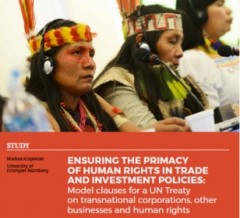
By Dr. Markus Krajewski
The international regime of trade and investment agreements is currently suffering from a significant legitimacy crisis, which should be considered as a window of opportunity for the introduction of new legal approaches to address the relationship between human rights and investment and trade policies. The UN Guiding Principles on Business & Human Rights are non-binding and so far, States have not fundamentally changed their treaty practices, for example in the Comprehensive Economic and Trade Agreement (CETA) between Canada and the EU. It is unlikely that rebalancing and restructuring the relationship between investment and trade rules on the one side, and human rights and on the other, in a treaty on businesses and human rights will have negative effects on the trade and investment performance of the parties of this treaty. This study explores the potential of a future treaty to help overcome the limitations and gaps of reforms within the trade regime, via provisions addressing three specific areas: first, regulating the relationship between human rights and trade and investment agreements; second, human rights impact assessments; and third, human rights obligations for export credit and investment guarantee schemes.
In October 2017, the third session of the UN intergovernmental working group on transnational corporations, other businesses and human rights will begin negotiations on the draft text for the treaty. With this study, CIDSE and its members seek to present proposals and put forward possible concrete wording for provisions that the treaty could contain, which can serve as a basis for wider discussion.
